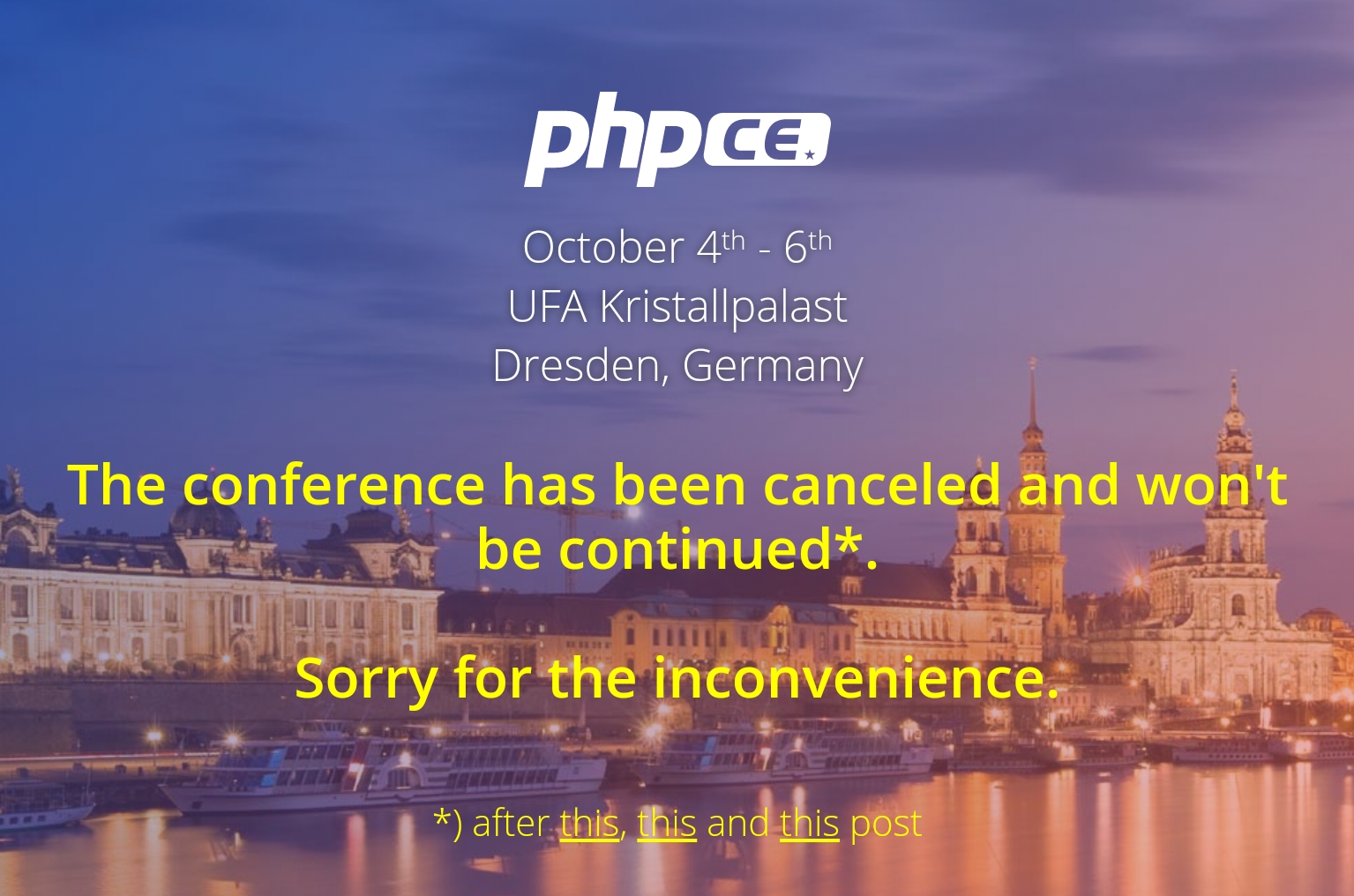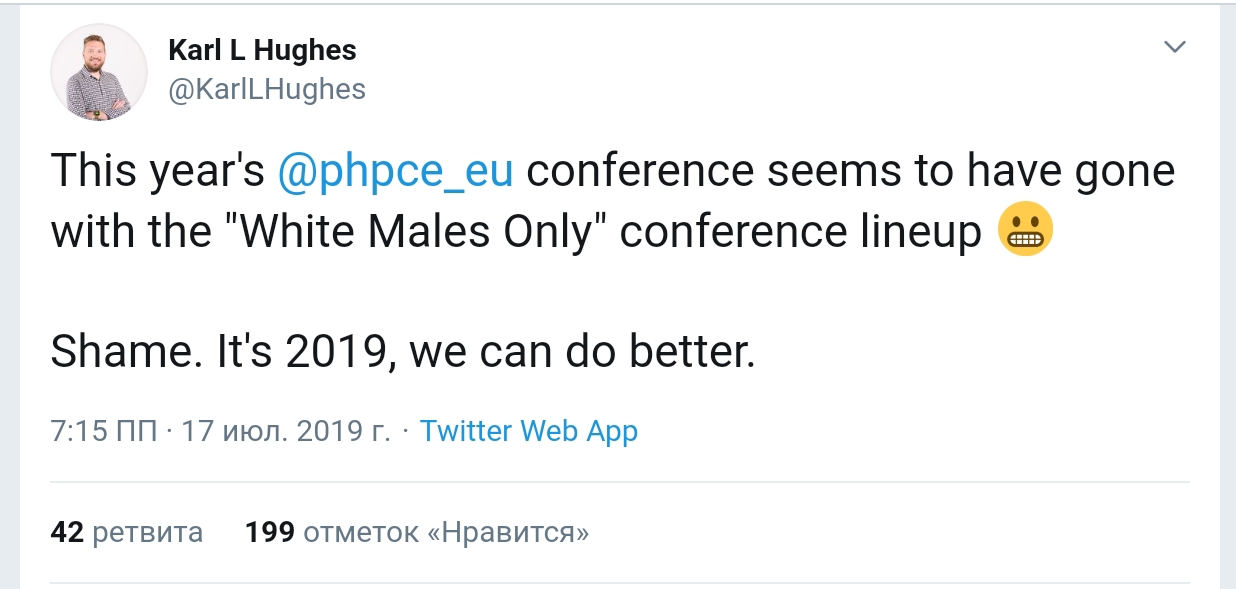PHP Central Europe conference canceled due to the fact that there were no women among the speakers
Social trends penetrate even deeper into those areas that seem very closed and detached from various kinds of political and public discussions. So, recently, the organizers of the international conference for PHP developers, scheduled for October this year, announced its cancellation. The reason was the scandal that arose after some members of the community noticed that there were no women among the speakers. Now, a stub hangs on the event’s website informing that phpCE is being canceled and will no longer be held.

During the preparation of the program, the organizers received more than 250 applications for speeches, 32 of which were selected. Already in July, criticisms of the organizers began to appear on Twitter with accusations of insufficient inclusion of the conference, in particular because all 32 speakers turned out to be white men.

(“It seems that this year the selection for the phpCE conference is limited to“ Only for white men. ”Shame. Outside 2019, we can do better.”)
Many supported Carl Hughes in his position, although a number of users indicated that the purpose of the conference was to collect and provide high-quality content that is in no way related to the gender or race of the speakers.

("Is it really not sexism and discrimination to focus on the field or color of the participants? Reports should be chosen based on the topic of the event, not taking into account the gender, race, orientation or religion of the speaker - this is my understanding of equality")
However, the invited speakers began to refuse to participate in PHP Central Europe one by one. Three days later, Larry Garfield, director of development for Platform.sh, said on his blog on Twitter that he would miss the conference this year.
He also said that he invited the organizers to engage in targeted involvement of women in phpCE performances in order to create greater gender diversity. The organizers, in turn, explained that out of more than 250 applications, only one belonged to a woman and was rejected, because the report did not contain unique content and was already presented at another conference. However, the expert did not consider this explanation sufficient, saying that the conference is not only a technical event, but also a social one, which means that it requires a greater variety of participants who will represent various social groups.
Another invited expert Mark Baker (Mark Baker) spoke even more categorically:
It is curious that last year phpCE included 39 reports, a woman was the author of only one of them, but then this did not cause such a heated public discussion.
In connection with this precedent, we decided to ask Elena Trescheva, a leading analyst at the Solar JSOC Cyber Attack Monitoring and Response Center, what she thinks about this as a professional and as a girl working in the industry, where mostly men speak at conferences:

During the preparation of the program, the organizers received more than 250 applications for speeches, 32 of which were selected. Already in July, criticisms of the organizers began to appear on Twitter with accusations of insufficient inclusion of the conference, in particular because all 32 speakers turned out to be white men.

(“It seems that this year the selection for the phpCE conference is limited to“ Only for white men. ”Shame. Outside 2019, we can do better.”)
Many supported Carl Hughes in his position, although a number of users indicated that the purpose of the conference was to collect and provide high-quality content that is in no way related to the gender or race of the speakers.

("Is it really not sexism and discrimination to focus on the field or color of the participants? Reports should be chosen based on the topic of the event, not taking into account the gender, race, orientation or religion of the speaker - this is my understanding of equality")
However, the invited speakers began to refuse to participate in PHP Central Europe one by one. Three days later, Larry Garfield, director of development for Platform.sh, said on his blog on Twitter that he would miss the conference this year.
He also said that he invited the organizers to engage in targeted involvement of women in phpCE performances in order to create greater gender diversity. The organizers, in turn, explained that out of more than 250 applications, only one belonged to a woman and was rejected, because the report did not contain unique content and was already presented at another conference. However, the expert did not consider this explanation sufficient, saying that the conference is not only a technical event, but also a social one, which means that it requires a greater variety of participants who will represent various social groups.
Another invited expert Mark Baker (Mark Baker) spoke even more categorically:
Forming a completely male lineup of speakers, the organizers - perhaps involuntarily - make it clear that this event is for men. Many potential participants, especially those belonging to minorities, look at the list of speakers and conclude that this event is not for them. It’s important not only the topics of speeches that are important to them, they are looking for role models, people similar to themselves, someone who would inspire them ... and they won’t find them in the list of speakers consisting exclusively of men.
It is curious that last year phpCE included 39 reports, a woman was the author of only one of them, but then this did not cause such a heated public discussion.
In connection with this precedent, we decided to ask Elena Trescheva, a leading analyst at the Solar JSOC Cyber Attack Monitoring and Response Center, what she thinks about this as a professional and as a girl working in the industry, where mostly men speak at conferences:
There is one question: why are you going to the conference? For what? To flatter your gender stereotypes or still listen to the opinions of smart people and draw conclusions? I go to professional events to find out what's new in the world of information security, what are the new risks, threats, how someone came to their opinion on the organization of protection. Communicate with specialists, ask a few questions and get high-quality answers.
In my humble opinion, at technical conferences it doesn’t matter at all who reads the report, male or female, and anyway, what is the gender composition of the speakers, what are the speakers' orientation and color.
All Articles